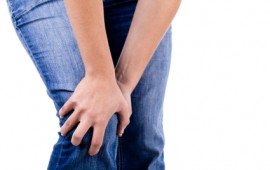Clicking Knees Causes and Treatments
Author: Shannon Miller Lifestyle

The knees are the largest and one of the most complex joints in your body.
Because it is used so much, the knees are vulnerable to many different injuries. Clicking knees are a very common symptom to several different injuries. Over time or after an injury you can develop clicking knees. Sometimes clicking knees are accompanied by pain, but more often than not the noise is the only symptom. This is typically caused by some part of the knee sitting in an improper position, so other parts of the legs are being used and stressed more than usual.
Possible Causes
Unnecessary Tissue– Some people develop additional unnecessary tissue or plica around the joint. The tissue can then become trapped and can cause a clicking noise when you move.
Runner’s Knee– Also known as Patellofemoral Syndrome, runner’s knee occurs when the kneecap is out of line and not tracking properly along the femur. This is the most likely cause of clicking knees. If you have pain, it most likely gets worse when walking downstairs or downhill. And it will manifest itself with pain right under or around the kneecap. This injury can put stress on the tibia and other bones in your leg and can cause clicking as you move the knee.
Damage of the Meniscus– The Meniscus is the shock absorber in your knee. It consists of two flat C-shaped disks that help to hold the kneecap in place. There are several different ways that it can tear, but most of them will cause you to feel a clicking or popping sensation and will likely swell. This type of injury is also very likely to hurt.
Arthritis– Inflammation in the joint caused by arthritis can also cause a clicking noise. The knee will align differently than usual and you may also notice some stiffness in the joint.
An ACL or MCL Tear– This is a painful injury, so you will most likely know right away the severity of this injury. Either of these ligaments in your knees will cause the knee to click because the knee will not sit in the same location as it did before the injury. The knee will be very stiff and tender and may also have some bruising from the sight of the injury.
When to Worry
If you are in pain, you should speak with your doctor as soon as possible to avoid further injury. If you are not in pain, the problem is most likely minor but should be addressed to prevent a more serious injury. Your doctor will examine your knee to determine what is causing the clicking noise to help narrow down what kind of treatment is appropriate.
When the clicking knee is not accompanied by other side effects such as pain or swelling then it may not be cause for concern. Many times the knee will click when it is expelling excess air that has become trapped in the joint. It may also be a sign that the knee is righting itself when it is experiencing excess pressure or friction in the area. This is similar to the sensation or noise that you experience when you “crack” your knuckles or other joints.
Treatment of Clicking Knees
There are many home treatments to consider for the treatment of clicking knees. RICE, along with NSAIDs(such as ibuprofen or aceteminophine) will help bring down any pain or swelling you may be experiencing.
The RICE protocol is effective for most sports-related injuries.
RICE stands for Rest, Ice, Compression, and Elevation.
Rest- Take a break from the activity that caused the injury. Your doctor may recommend that you use crutches to avoid putting weight on your leg.
Ice- Use cold packs for 20 minutes at a time, several times a day. Do not apply ice directly to the skin.
Compression- To prevent additional swelling and blood loss, wear an elastic compression bandage.
Elevation- To reduce swelling, recline when you rest, and put your leg up higher than your heart.
Stretching and other exercises
Exercises that will strengthen and lengthen the quadriceps and the hamstrings can help alleviate the clicking noise you are experience. A physical therapist can give you a personalized set of exercises to treat your specific injury. Walk-Fit Sponsor In Motion Physical Therapy is a wonderful resource, or you can find a Physical Therapist near you here.
Orthopedic Surgeon
Particularly if it is a meniscus, MCL, or ACL tear or another severe injury, you may be facing surgery. If you have concerns please bring them up to your doctor as soon as possible.
